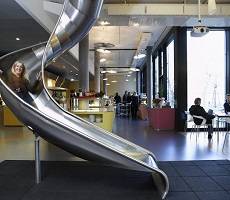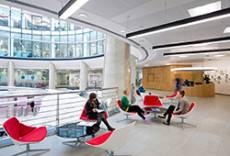May 20, 2014
Office design should meet the basic human needs of workers, claims report
 Designers can install sleep pods, slides and play areas in an effort to create a cool office, but the problem is that for every renowned Google campus are countless stuffy offices with fluorescent lighting and cramped, crowded conditions. When you drill right down to it office workers want those responsible for office design to meet their basic human needs; with more natural light, effective heating and air conditioning and the better use of office space. This is according to the results of a survey by Steelcase of more than 800 office workers across the UK to mark the beginning of Clerkenwell Design Week. It found that despite British workers appreciating the latest technology and high-quality office design, better lighting and more control over temperature settings would be a big step forward towards their dream office.
Designers can install sleep pods, slides and play areas in an effort to create a cool office, but the problem is that for every renowned Google campus are countless stuffy offices with fluorescent lighting and cramped, crowded conditions. When you drill right down to it office workers want those responsible for office design to meet their basic human needs; with more natural light, effective heating and air conditioning and the better use of office space. This is according to the results of a survey by Steelcase of more than 800 office workers across the UK to mark the beginning of Clerkenwell Design Week. It found that despite British workers appreciating the latest technology and high-quality office design, better lighting and more control over temperature settings would be a big step forward towards their dream office.

























May 7, 2014
The business of workplace design and management; new issue of Insight is now available
by Sara Bean • Comment, News, Newsletter, Workplace design